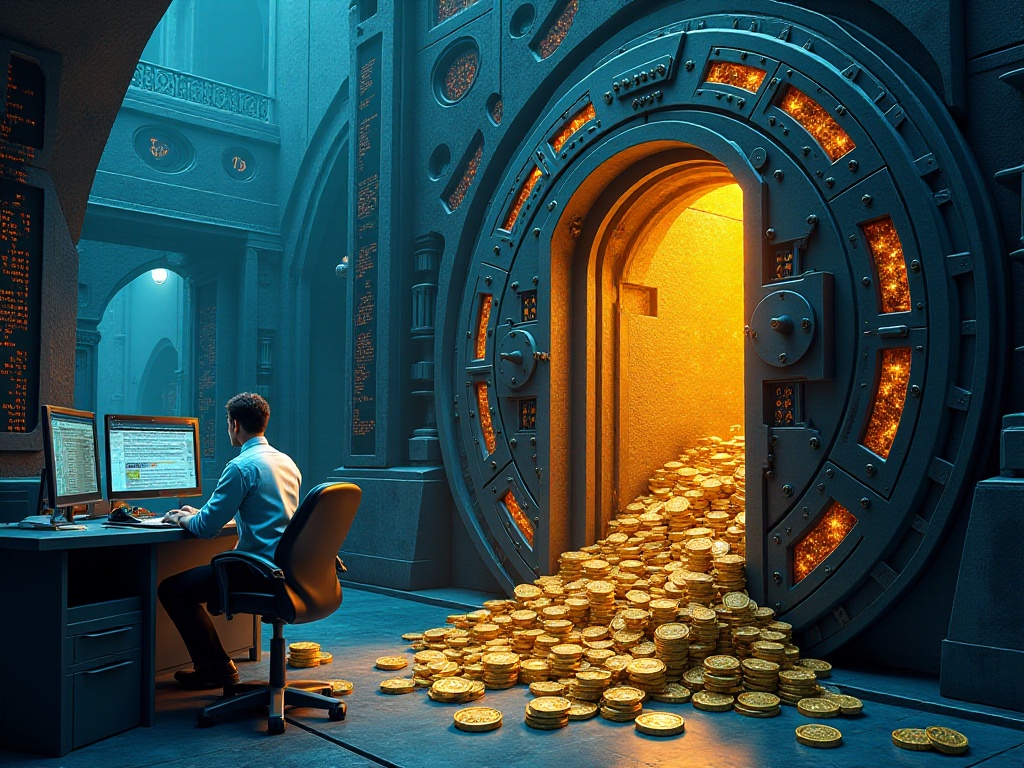

Alarming Findings
Hello everyone! Today I'm sharing some incredibly shocking news. Honestly, when I first saw this data, I was completely stunned! Can you imagine? 56% of token listings on DEX platforms involve insider trading! What does this mean? Simply put, for every two tokens listed, one is suspected of insider trading. This data comes from the latest investigation report by Solidus Labs, and I was absolutely astounded when I read it.
As a long-time observer of the cryptocurrency market, I've seen many outrageous things, but this truly exceeds my understanding. How is this normal market behavior? It's essentially a huge money-harvesting machine! Think about all those small retail investors - their hard-earned money is being easily harvested by insider traders.
I remember last year when a friend excitedly told me about a newly listed token he bought, only to see it drop 90% on the first day of listing. At the time, we thought it was just the project team's issue, but now thinking back, it was likely a victim of insider trading. This kind of thing isn't isolated anymore - it's become the norm, which is terrifying!
The Data Speaks
Let's take a closer look at Solidus Labs' investigation report. They discovered over 100 suspicious insider traders who participated in more than 400 insider trading incidents. Just these numbers alone are frightening, but what's scarier is that this might only be the tip of the iceberg.
Let me explain how these numbers were obtained. Researchers used highly professional blockchain analysis tools to conduct in-depth analysis of large amounts of transaction data. They focused on abnormal trading behaviors before and after token listings, such as sudden large transactions and unusual price fluctuations.
For example, suppose a token is preparing to list on a DEX platform. Normally, there shouldn't be much trading activity for this token before listing. However, researchers found that certain wallet addresses would start purchasing large amounts of these tokens before listing. This behavior itself is very suspicious, as ordinary investors couldn't possibly have access to this information in advance.
Even more shocking is that these suspicious accounts show highly similar trading patterns. They typically start acting 12-24 hours before listing, buying large amounts of tokens, then quickly selling for profit after listing. These operation methods are textbook examples of insider trading!
I've done some statistics myself. In the past year, I've observed at least 50 newly listed tokens showing similar trading patterns. Every time these tokens list, there's a group of "smart investors" who buy in advance and then frantically sell during the listing period. These people often achieve profits of several hundred times their investment, while ordinary investors suffer heavy losses.

Exposing the Inside Story
The methods these insider traders use are diverse yet show striking similarities. Let me analyze their common tactics in detail.
First is information advantage. These insider traders usually have special relationships with project teams or exchanges, allowing them to know the exact listing time and initial price in advance. This information is crucial for trading as it helps traders enter at the optimal time.
I know a friend who works on blockchain projects, and he told me that some project teams specifically create "private investment groups," ostensibly for raising development funds but actually setting up platforms for insider trading. Members in these groups can buy tokens at extremely low prices and then sell them to uninformed retail investors during listing.
Second is capital advantage. These insider traders usually control large amounts of funds and can easily influence token price movements. They often operate in "groups," with several large holders acting together to create stronger market influence.
I've witnessed a typical case firsthand. Before a new token listed, several large holders suddenly bought large amounts of tokens in a short time, causing the price to skyrocket. After listing, these large holders began selling in batches, and the price quickly collapsed. Later blockchain data analysis revealed frequent fund transfers between these large holders' wallet addresses, clearly showing an organized group.
Then there's technical advantage. Many insider traders use professional trading bots that can complete large volumes of trades in extremely short times. These bots can set complex trading strategies, such as automatically buying or selling when prices reach certain levels. Ordinary investors simply cannot compete with these high-frequency trading bots.

Regulatory Challenges
When it comes to why DEX platforms have become hotbeds for insider trading, there are numerous reasons. I think the most fundamental issue is the natural contradiction between DEX platforms' decentralized nature and effective regulation.
First, trades on DEX platforms are completely automated, executed through smart contracts without intermediaries. While this mechanism indeed improves trading efficiency and reduces costs, it also makes regulation extremely difficult. Without a centralized institution to review trades, insider traders can easily conduct various operations without being detected.
I remember a typical example from last year. When obvious price manipulation appeared on a DEX platform, the platform stated they were powerless to act because once smart contracts are deployed, they cannot be modified, and they have no authority to intervene in user trading behavior.
Second, user identity verification mechanisms on DEX platforms are very weak. Many platforms don't even require KYC verification - all you need is a wallet address to trade. This provides insider traders with an excellent anonymous environment. They can use multiple wallet addresses to disperse trades, making it difficult for regulatory authorities to track real identities.
Add to this the cross-border trading issue. The cryptocurrency market is global, while regulatory policies vary by country. Insider traders can exploit these regulatory differences, operating in areas with weaker oversight. Even if illegal behavior is discovered, the difficulties in cross-border law enforcement make them fearless.

Future Outlook
Facing such a severe situation, I believe future improvements should be more comprehensive and in-depth.
On the technical level, besides continuing to enhance blockchain analysis tools, we need to develop smarter risk control systems. For example, we can use machine learning algorithms to build more complex trading models that can not only identify individual suspicious transactions but also discover connections between trades. I know some projects are already trying to use neural networks to analyze trading patterns, with decent results.
Additionally, smart contract security needs strengthening. More restrictions can be added at the contract level, such as setting trading delays and limiting transaction volumes from single addresses. This gives regulatory bodies more time to discover and handle abnormal situations.
On the institutional level, I think we need to establish a more complete industry self-regulation mechanism. We can establish industry associations and set unified trading standards and punishment measures. Violators would face not only legal sanctions but also reputational damage.
Meanwhile, we must strengthen investor education. Many people enter the cryptocurrency market just for quick wealth, making them easy targets for insider traders. If we can increase investors' risk awareness and professional knowledge, helping them learn to identify suspicious trades, the market environment will naturally improve.
I'm particularly looking forward to seeing more innovative solutions. For example, some projects are researching how to apply mature regulatory experiences from traditional financial markets to DEX platforms. While this requires finding a balance between decentralization and regulation, I believe it's a direction worth trying.

A Message to Readers
As an old hand who has experienced multiple market fluctuations, I especially want to say a few heartfelt words to newcomers preparing to enter the market.
First, maintain a clear head. While the cryptocurrency market does offer opportunities for profit, the risks are also high. Don't let those "overnight wealth" stories cloud your judgment, as what you're seeing might just be carefully designed traps.
Second, do your homework. Before investing in any token, carefully research the project team's background, technical strength, and development plans. If you find project information isn't transparent or there are too many unreasonable promises, it's best to stay away.
Finally, learn to control risk. Don't invest all your funds in one project, and don't easily trust others' investment advice. Remember, in this market, what's most important isn't how much money you make, but how to protect your funds' safety.
For investors already in the market, I suggest following legitimate information channels and learning to identify signs of market manipulation. If you discover suspicious trading behavior, don't hesitate to report it to platforms and regulatory authorities. Only when each of us takes action can we make the market healthier.
Let's work together to contribute to building a fairer, more transparent cryptocurrency market. I believe that in the near future, we will definitely see a more regulated and healthier market environment.






 Français
Français Deutsch
Deutsch Русский
Русский Português
Português Español
Español Italiano
Italiano Türk
Türk
